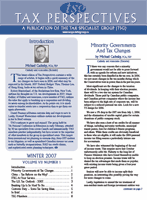
PDF Format
 Issue Contents Issue Contents
 All Issues All Issues
Winter 2007
Volume 7, Number 1
The information in Tax Perspectives is prepared for general interest only. Every effort has been made to ensure that the contents are accurate. However, professional advice should always be obtained before acting and TSG member firms cannot assume any liability for persons who act on the basis of information contained herein without professional advice.
China — Tax Reform on the Way?
By Thomas Lee, LL.M, FHKSA
For the past two decades, China has had a two-tier corporate tax system — one for corporations owned by China residents (domestic enterprise) and another for corporations owned by foreigners (foreign-owned enterprise). A Chinese foreign joint venture will be taxed as a domestic enterprise if the foreign capital represents less than 25% of the total capital of the joint venture.
Unlike the Canadian tax system, which overtly discriminates in favour of corporations controlled by Canadian residents, the China system does the reverse. Foreign-owned enterprises are given tax holidays, incentives, and a reduced corporate tax rate, while domestic enterprises are not.
Tax Incentives
The tax incentives for foreign-owned enterprises fall into three categories. The first is a reduced corporate tax rate. The normal rate in China is 33% (30% being the national rate and 3%, the local rate). Depending on where the entity is located, and the type of activity, the corporate tax rate may be reduced to 15% or 24%. The second type of exemption is a tax holiday, the most typical of which is a two-year exemption commencing with the entity's first profitable year after netting off all losses brought forward. There are several other additional incentives, but the most common is a refund of corporate taxes, if profits are re-invested in China activities.
The corporate tax system raises very little tax revenue. Through use of these incentives, and creative transfer pricing arrangements, very little corporate tax is actually paid by foreign-owned enterprises. One particular issue which has been noted is that corporations will sometimes wind up their activities once the tax holiday has expired, only to reappear as another business in another location, with a new tax exemption.
Possible Reforms
The China economy has been carefully planned by the Central Government so that growth can be controlled and incentives for foreign investment can be targeted. China has been extremely successful in attracting foreign investment. Tax incentives are an important part of this process. This probably explains the reluctance of the Central Government to carry out tax reforms up until now, even though the need for change has been long identified.
Legislation is now to be considered by the Central Government to unify the corporate income tax systems, with a standard rate for foreign and domestic enterprise being set at 25%. Most exemptions will be scrapped. Future preferential tax treatments will be given to encourage industries such as high-tech and environmental industries. It is possible that the legislation could be passed as early as this Spring, and could take effect by 2008. It is likely that foreign companies will be given a grace period where the existing system can be applied, possibly for as long as five years.
It is anticipated that foreign companies with an interest in China may speed up their plans to create a Chinese enterprise, in order to benefit from the existing system, prior to reforms.
China is a difficult place for foreigners to do business. Aside from fundamental differences in language and culture, there are difficulties in adjusting to its legal and financial environment. People who are unprepared for this will inevitably experience culture shock, frustration, and possibly the ultimate failure of their endeavour. It takes time to set up a Chinese business and, now more than ever, professional advice is essential.
|